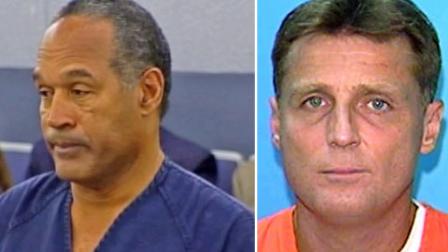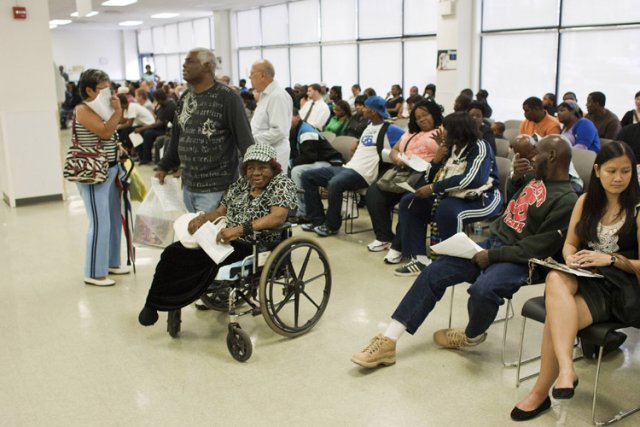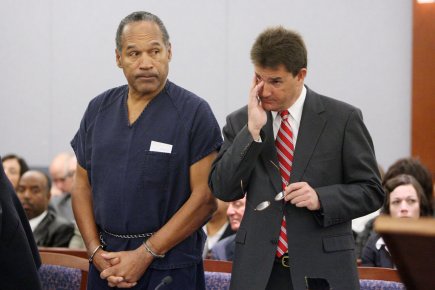Widgetized Section
Go to Admin » Appearance » Widgets » and move Gabfire Widget: Social into that MastheadOverlay zone
Glen Rogers claims he killed OJ Simpson’s ex-wife and friend

The Investigation Discovery show, « My Brother the Serial Killer, » will air Wednesday. The film is a look at Glen Rogers, a carnival worker whom Florida jurors convicted in 1997 of killing a woman in a Tampa motel room.
Rogers, who is now 50, was also convicted of murder in California and is a suspect in homicides in Mississippi, Louisiana and Kentucky – and possibly several other states.
Most of his victims were women he had met in bars while drifting across the country. All of his victims were stabbed to death. With blazing blue eyes, a scraggly beard and long, blond hair, Rogers was arrested in November 1995, near Waco, Ky., after a nationwide manhunt for the so-called « Cross-Country Killer » and a 100 mph chase.
Rogers, who is from Hamilton, Ohio, met Nicole Brown Simpson in 1994 when he was living in Southern California, his family says in the documentary.
A criminal profiler in the film says he received paintings by Rogers with clues possibly linking him to the 1994 murders of Nicole Brown Simpson and her friend, Ronald Goldman. The profiler says that Rogers sent him a painting of the murder weapon used in the slayings.
« I believe that Glen believes he killed them, » said Anthony Meoli, an Atlanta criminal profiler who has received more than 1,000 letters from Rogers and has interviewed him in prison.
Simpson was accused in those killings but the so-called « trial of the century » in Los Angeles ended with his acquittal in 1995.
Simpson never testified at the criminal trial, but memorably demonstrated in court that a glove found near the slaying scene did not fit his hand. He testified at length in a wrongful death trial that led a Los Angeles civil court jury in 1997 to find him liable for damages in the case. Simpson is serving a prison sentence in Nevada after being convicted in 2008 of leading five men, including two with guns, in a September 2007 confrontation with two sports memorabilia dealers and a middleman at a Las Vegas casino-hotel.
Much of the film is narrated by Rogers’ brother, Clay Rogers, who used to rob homes with Glen Rogers as a teen but in 1993, called police on his brother after finding a body at the family’s Kentucky cabin.
Clay Rogers said that in 1994, weeks before the infamous murders, his brother told him about meeting Nicole Simpson.
« They’ve got money, they’re well off and I’m taking her down, » Clay Rogers recalls Glen Rogers saying.
Other family members also said Glen Rogers talked about meeting Simpson’s ex-wife.
In a statement, Goldman’s sister criticized the documentary.
« I am appalled at the level of irresponsibility demonstrated by the network and the producers of this so-called documentary, » Kim Goldman said. « This is the first time we are hearing about this story, and considering that their ‘main character,’ Glen Rogers, confessed to stabbing my brother and Nicole to death, you would think we would be in the loop. »
Meoli said Rogers told him that OJ Simpson paid him to break into Nicole Brown Simpson’s house to steal a pair of $20,000 earrings. Other clues, Meoli said, were that Rogers drove a white pickup for his construction job – a white pickup was seen near the Simpson house on the day of the murders – and that a second bloody footprint at the scene was never identified.
Rogers’ family also said he sent his mother a gold angel pin with a diamond; Rogers later wrote to Meoli that he had sent it to his mother the day after the Simpson murders and implied that he stole it from Nicole Brown Simpson. « It’s something everyone missed, » Rogers wrote. Rogers’ mother wore the pin at his Florida murder trial.
« All those things put together a plausible alternative theory, » said Meoli.
In 1996, an Ohio newspaper reported that Rogers told his attorneys that he met Nicole Brown Simpson in a Los Angeles bar.
The film’s director, David Monaghan, said Tuesday that he feels investigators should look into Rogers’ claims of killing Simpson and Goldman – and the inmate should be held accountable for several other murders around the country as well.
« I considered very closely on whether I was part of a con game by Glen Rogers, » said Monaghan, who said he began looking into Rogers’ life during the Tampa trial. « I met many of his victims’ families and I met families who have no closure, because Glen has not faced trial in those states. I believe he should not face the death penalty until all those crimes have been investigated. »
But at least one detective who interviewed Rogers, though, says the convicted killer is lying in a misguided effort to get off death row.
Dan Frazee, a retired sheriff’s deputy from Clermont County, Ohio, questioned Rogers about a 1992 unsolved homicide while Rogers was in prison. Rogers tried to make Frazee believe he had knowledge of the case when he really didn’t, in hopes of going to Ohio, Frazee said.
« He’s got nothing to do in prison right now but sit there and play games, » Frazee said, adding that Rogers talked incessantly about death and murder and was « the most evil person I’ve ever talked to. »
« It’s like he has no soul, » said Frazee.




























































